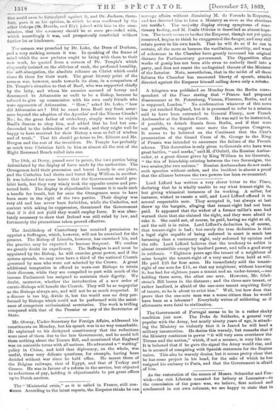The sermon was preached by Dr. Lake, the Dean of
Durham, pnd a very striking sermon it was. In speaking of the frame of mind which the new prelates ought to bring with them to their new work, he quoted from a sermon of Dr. Temple's which eloquently insisted on the oblivion of rank, the profound humility, the self-abnegation, the absolute reliance on Christ which could alone fit them for their work. The great literary point of the sermon was, however, made towards its close, in a comparison of Dr. Temple's situation to that of Basil, who was supported chiefly by the laity, and whom his enemies accused of heresy and denounced to Athanasius as unfit to be a Bishop, because he refused to give up communion with his own early friends who were opponents of Athanasius. " How," asked Dr. Lake, " how did Athanasius act ? Did he exact from Basil any fresh assur- ance beyond the adoption of the Apostles' and the Nicene Creeds? No; he, the great father of orthodoxy, simply wrote to enjoin Basil's diocese to obey him, and added that he had but con- descended to the infirmities of the weak, and they might well be happy to have received for their Bishop a man so full of wisdom and of truth." That bit should go home to Dr. Ellicott and Mr. Burgon and the rest of the tremblers. Dr. Temple has probably as much true Christian faith in him as almost all the rest of the Right Reverend Bench rolled into one.


































 Previous page
Previous page